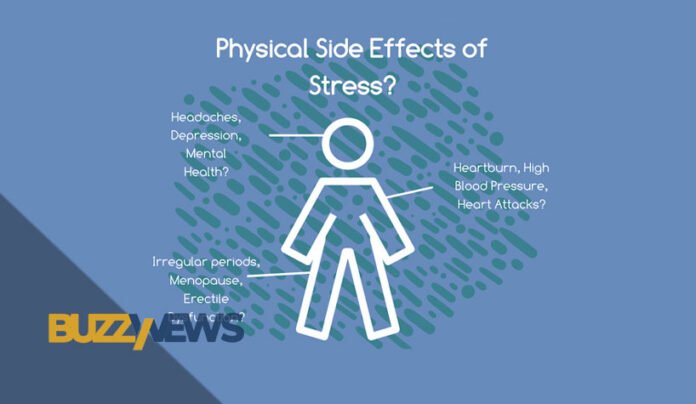While periodic stress is a normal part of life, chronic stress can seriously impact physical health. Understanding the mechanisms by which ongoing stress harms the body can empower you to minimize its detrimental effects and make healthy lifestyle changes.
How Chronic Stress Affects Physiology
Frequent triggering of the body’s adaptive stress response can gradually cause dysregulation across multiple systems:
Cardiovascular System
- Hypertension – frequent vasoconstriction, fluid retention increases blood pressure.
- Atherosclerosis – inflammatory mediators damage blood vessels over time.
Endocrine System
- Diabetes – excess cortisol promotes insulin resistance.
- Obesity – cortisol increases appetite and fat storage.
- HPA axis – constant activation depletes stress hormones long-term.
Immune System
- Suppressed defenses – cortisol reduces lymphocytes, NK cells, neutrophil activity.
- Inflammation – elevated inflammatory cytokines (IL-6, CRP, TNF).
Neurologic System
- Headaches – chronic muscle tension and reduced brain blood flow.
- Insomnia – excitatory hormones like cortisol disrupt sleep.
- Anxiety/depression – stress alters neurotransmitter balance in brain.
Gastrointestinal System
- Ulcers – stress increases stomach acid production and inflammation.
- Leaky gut – cortisol disrupts intestinal barrier function.
In summary, the cumulative effects of stress hormones, neurotransmitters, and inflammatory cytokines underlie the wide-ranging impacts stress has on the body.
Health Behaviors Worsened by Stress
In addition to direct physiological effects, chronic stress promotes unhealthy behaviors that indirectly harm physical wellbeing:
- Poor eating habits – stress increases cravings for sugary, fatty comfort foods.
- Sedentary lifestyle – stress and fatigue promote inactivity.
- Sleep deprivation – stress-induced insomnia prevents restorative sleep.
- Smoking/heavy drinking – people often use substances to cope with stress.
- Neglecting medical care – high stress lowers motivation to get preventive care.
Lifestyle Approaches to Counteract Stress
Making certain lifestyle changes can help minimize stress’ detrimental health impacts:
- Exercise – aim for 30-60 minutes of activity 3-5 days a week to relax nervous system. Jogging, swimming, cycling, yoga and pilates are great options.
- Balanced nutrition – eat a diet focused on lean proteins, fruits, vegetables, whole grains. Limit sugar, saturated fats, processed foods.
- Restful sleep – aim for 7-9 hours per night. Develop good sleep habits like limiting electronics before bed. Consider cognitive behavioral therapy for insomnia.
- Stress management techniques – try meditation, deep breathing, progressive muscle relaxation, cognitive restructuring of thoughts.
- Social connection – spend time with uplifting family and friends to reduce loneliness. Join a support group.
- Professional help – short-term counseling or therapy can provide support and accountability.
The Path to Lifelong Health
Managing stress through healthy lifestyle choices and behaviors empowers you to minimize its detrimental effects on the body. Reducing strain on the cardiovascular, endocrine, immune and neurologic systems protects overall physical health – helping you feel your best both mentally and physically.
5 Effective Ways to Reduce Stress
1. Mindful Breathing Techniques
Embrace the Calming Power of Deep Breaths
One of the simplest yet potent stress-busting techniques is mindful breathing. Take a few moments to inhale deeply, allowing your abdomen to expand, and then exhale slowly. This deliberate focus on your breath can instantly calm the nervous system, promoting a sense of tranquility.
2. Physical Activity: A Natural Stress Reliever
Energize Your Body to Soothe Your Mind
Engaging in regular physical activity is a proven way to alleviate stress. Whether it’s a brisk walk, a workout session, or yoga, exercise releases endorphins—your body’s natural stress relievers. Find an activity you enjoy, and make it a part of your routine for a healthier, stress-resilient lifestyle.
3. Mindfulness Meditation for Mental Clarity
Find Serenity in the Present Moment
Mindfulness meditation involves focusing your attention on the present moment without judgment. Dedicate a few minutes each day to sit quietly, concentrate on your breath, and let go of racing thoughts. This practice enhances self-awareness and cultivates a peaceful mindset, reducing stress over time.
4. Effective Time Management
Organize Tasks for a Stress-Free Day
Often, stress arises from feeling overwhelmed by tasks. Implementing effective time management strategies can significantly reduce this pressure. Prioritize tasks, break them into smaller, manageable steps, and celebrate accomplishments. This approach not only enhances productivity but also diminishes stress levels.
5. Healthy Lifestyle Choices for Resilience
Nourish Your Body, Nourish Your Mind
A balanced diet, sufficient sleep, and staying hydrated are essential components of a stress-resistant lifestyle. Nutrient-rich foods and proper sleep contribute to overall well-being, empowering your body to handle stress more effectively. Making these healthy choices is a proactive way to fortify your resilience against daily pressures.

